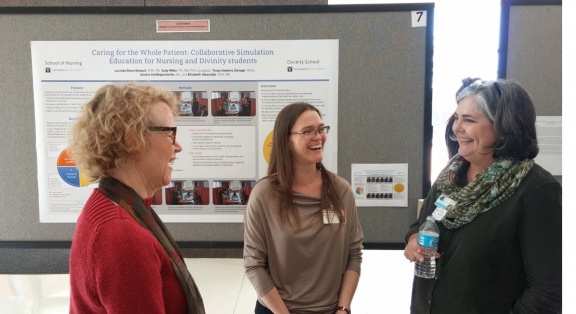Jessica VanRegenmorter, Standardized Patient Educator in the Center for Experiential Learning and Assessment (CELA), recently presented at the annual Tennessee Simulation Alliance conference on an interprofessional simulation project that she developed collaboratively with a team of Vanderbilt educators.
The workshop, entitled “Professional team building: Bringing nursing and divinity students together through simulation,” was presented by Jessica, Trudy Hawkins Stringer of the Vanderbilt Divinity School (VDS) and Elizabeth Alexander, Lucinda Steen Stewart, and Sally Miller of the Vanderbilt School of Nursing (VUSN). The team developed and implemented a joint pilot simulation in the spring of 2015 that focused on improving understanding and communication across disciplines (specifically nursing and divinity) and increasing awareness about barriers and facilitators to effective teamwork in patient care.
During the workshop, presenters guided learners through the step-by-step process of designing and executing an educational simulation across departments, highlighting challenges of the process and approaches to addressing those challenges. Learners participated in a carefully crafted simulation involving a standardized patient (SP)* and were immersed in a post-session debrief similar to the one utilized during the pilot project. Presenters shared metrics used to assess the effectiveness of the project and facilitated a brainstorming session to explore collaborative projects that attendees could initiate at their own institutions.
Workshop attendees were particularly receptive to the level of realism and learner buy-in facilitated by the SP (as opposed to the manikin-based methodology they had utilized previously for similar high-emotion scenarios). They identified potential projects to pursue within their institutions as well as elements of the pilot project they would like to incorporate into their current educational activities. Attendees specifically noted the benefits of the post-simulation debrief format and the inclusion of the SP for the “patient perspective” as distinct elements they would incorporate into their curricula.
* An SP is an individual trained to portray a patient, family member, health care team member, or almost any participant in the health care environment. In this case, the SP was a mother who had recently given birth and was faced with the emotional and medical ramifications of a sudden, necessary medical intervention.
